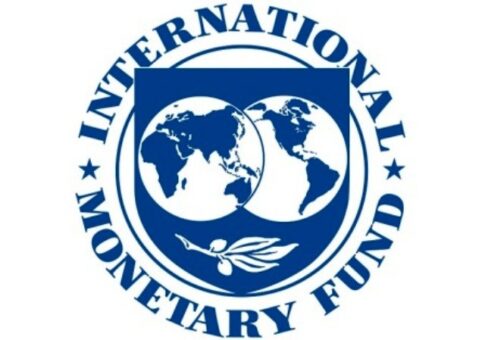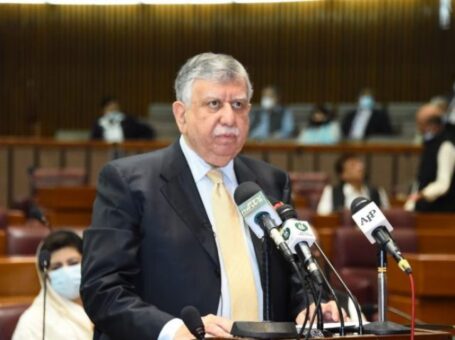ISLAMABAD: The International Monetary Fund (IMF) on Monday outlined prior actions for Pakistan for the release f $1.059 billion under Extended Fund Facility (EFF).
The IMF stated that its mission led Ernesto Ramirez Rigo held virtual discussions during October 4–November 18, 2021 in the context of the sixth review of the authorities’ reform program supported by the IMF’s Extended Fund Facility (EFF).
The IMF said that it had reached a staff level agreement with the Pakistan authorities on policies and reforms needed to complete the sixth review under the EFF.
The agreement is subject to approval by the Executive Board, following the implementation of prior actions, notably on fiscal and institutional reforms.
Completion of the review would make available SDR 750 million (about US$1,059 million), bringing total disbursements under the EFF to about US$3,027 million and helping unlock significant funding from bilateral and multilateral partners.
An additional SDR 1,015.5 million (about US$1,386 million) was disbursed in April 2020 to help Pakistan address the economic impact of the COVID-19 shock.
Despite a difficult environment, progress continues to be made in the implementation of the EFF-supported program. All quantitative performance criteria (PCs) for end-June were met with wide margins, except for that on the primary budget deficit.
Notable achievements on the structural front include the finalization of the National Socio-Economic Registry (NSER) update, parliamentary adoption of the National Electric Power Regulatory Authority (NEPRA) Act Amendments, notification of all pending quarterly power tariff adjustments, and payment of the first tranche of outstanding arrears to independent power producers (IPPs) to unlock lower capacity payments fixed in renegotiated power purchase agreements (PPAs).
The authorities have also made progress in improving the anti-money laundering and combating the financing of terrorism (AML/CFT) framework, although some additional time is needed to strengthen its effectiveness.
On the macroeconomic front, available data suggests that a strong economic recovery has gained hold, benefiting from the authorities’ multifaceted policy response to the COVID-19 pandemic that has helped contain its human and macroeconomic ramifications.
The Federal Board of Revenue’s (FBR) tax revenue collection has been strong. At the same time, external pressures have started to emerge: a widening of the current account deficit and depreciation pressures on the exchange rate—mainly reflecting the compound effects of the stronger economic activity, an expansionary macroeconomic policy mix, and higher international commodity prices.
In response, the authorities have started to adjust policies, including by gradually unwinding COVID-related stimulus measures.
The State Bank of Pakistan (SBP) has also taken the right steps by starting to reverse the accommodative monetary policy stance, strengthening some macroprudential measures to contain consumer credit growth, and providing forward guidance.
In addition, the government plans to introduce a package of fiscal measures targeting a small reduction of the primary deficit with respect to last fiscal year based on: (i) high-quality revenue measures to make the tax system simpler and fairer (including through the adoption of reforms to the GST system); and (ii) prudent spending restraint, while fully protecting social spending.
These policies will help safeguard the positive near-term outlook, with growth projected to reach, or exceed, 4 percent in FY 2022 and 4.5 percent the fiscal year after that.
However, inflation remains high, although it should start to see a declining trend once the pass-through of rupee depreciation is absorbed, and temporary supply-side constraints and demand-side pressures dissipate.
However, the current account is expected to widen this fiscal year despite some export growth, reflecting the rising import demand and international commodity prices.
However, this economic outlook continues to face elevated domestic and external risks, while structural economic challenges persist.
In this regard, and looking beyond the near term, discussions also focused on policies to help Pakistan achieve sustainable and resilient growth to the benefit of all Pakistanis.
On the fiscal policy front, staying on course on achieving small primary surpluses remains critical to reduce high public debt and fiscal vulnerabilities. Continued efforts to broaden the tax base by removing remaining preferential tax treatments and exemptions will help generate much-needed resources to scale up critical social and development spending.
Monetary policy needs to remain focused on curbing inflation, preserving exchange rate flexibility, and strengthening international reserves.
As economic stability becomes entrenched and the independence of the SBP is strengthened with the approval of the SBP Act Amendments, the central bank should gradually advance the preparatory work to formally adopt an inflation targeting (IT) regime in the medium term, underpinned by a forward-looking and interest-rate-focused operational framework.
While some key elements of IT are already in place, including a medium-term inflation objective and prohibition of monetary financing, additional efforts are needed, to modernize the SBP’s operational framework as well as to strengthen monetary transmission and communication.
Advancing the strategy for the electricity sector reforms, agreed with international partners, is important to bring the sector to financial viability, and tackle its adverse spillovers on the budget, financial sector, and real economy. In this regard, steadfast implementation of the Circular Debt Management Plan (CDMP) will help guide the planned management improvements, cost reductions, timely alignment of tariffs with cost recovery levels, and better targeting of subsidies to the most vulnerable.
Substantially lowering supply costs, however, will require a modern electricity policy that: (i) ensures that PPAs do not impose a heavy burden on end-consumers; (ii) tackles the poor and expensive generation mix, including a wider use of renewables; and (iii) introduces more competition over the medium term.
Strengthening the medium-term outlook, including by unlocking sustainable and resilient growth, creating jobs, and improving social outcomes, hinges on ambitious efforts to remove structural impediments and facilitate the structural transformation of the economy. To this end, increased focus is needed on measures to strengthen economic productivity, investment, and private sector development, as well as to address the challenges posed by climate change:
Improving the governance, transparency, and efficiency of the state-owned enterprise (SOE) sector: Putting Pakistan’s public finances on a sustainable path—while leveling the playing field of firms across the economy and improving the provision of services—requires following through with the current reform agenda, especially with the: (i) creation of a modern legal framework; (ii) better sectoral oversight by the state, supported by regular audits, especially of the largest SOEs; and (iii) reduction of the footprint of the state in the economy, based on the recently completed comprehensive stocktaking.
Fostering the business environment, governance, and the control of corruption:The business climate would benefit from simplifying procedures for starting a business, approving FDI, preparing trade documentation, and paying taxes; and the empowerment of people and production of more complex goods from investing more in education and human capital. Ensuring a level playing field and the rule of law also remains essential, mainly by bolstering the effectiveness of existing anti-corruption institutions and accountability of high-level public officials and by completing the much-advanced action plan on AML/CFT.
Boosting competitiveness, and exports: To this end, key objectives include: (i) implementing the approved national tariff policy, based on time-bound strategic protection; (ii) negotiating new free trade agreements; and (iii) facilitating the integration in global supply chains by improving firms’ reliability and product quality, and registering firms with all necessary entities for tax and business purposes.
Promoting financial deepening and inclusion: To better channel savings toward productive investment, improve the allocation of resources, and diversify risks, key policies remain: (i) entrenching macroeconomic stability; (ii) strengthening institutional and regulatory frameworks; (iii) creating conditions that allow for a greater role of private credit; and (iv) boosting financial coverage of underserved segments of the population and SMEs.
Stepping up to climate change: Worldwide, Pakistan ranks both among the top 10 countries with the largest damages from climate-related disasters and top 20 countries with the largest greenhouse gas (GHG) emissions. Critical next climate policy steps are: (i) accelerating the finalization of the authorities’ National Adaptation Plan (NAP); and (ii) implementing an adequate set of measures to meet the COP26 Nationally Determined Contribution (NDC) targets and securing sufficient financing, including from international partners.




